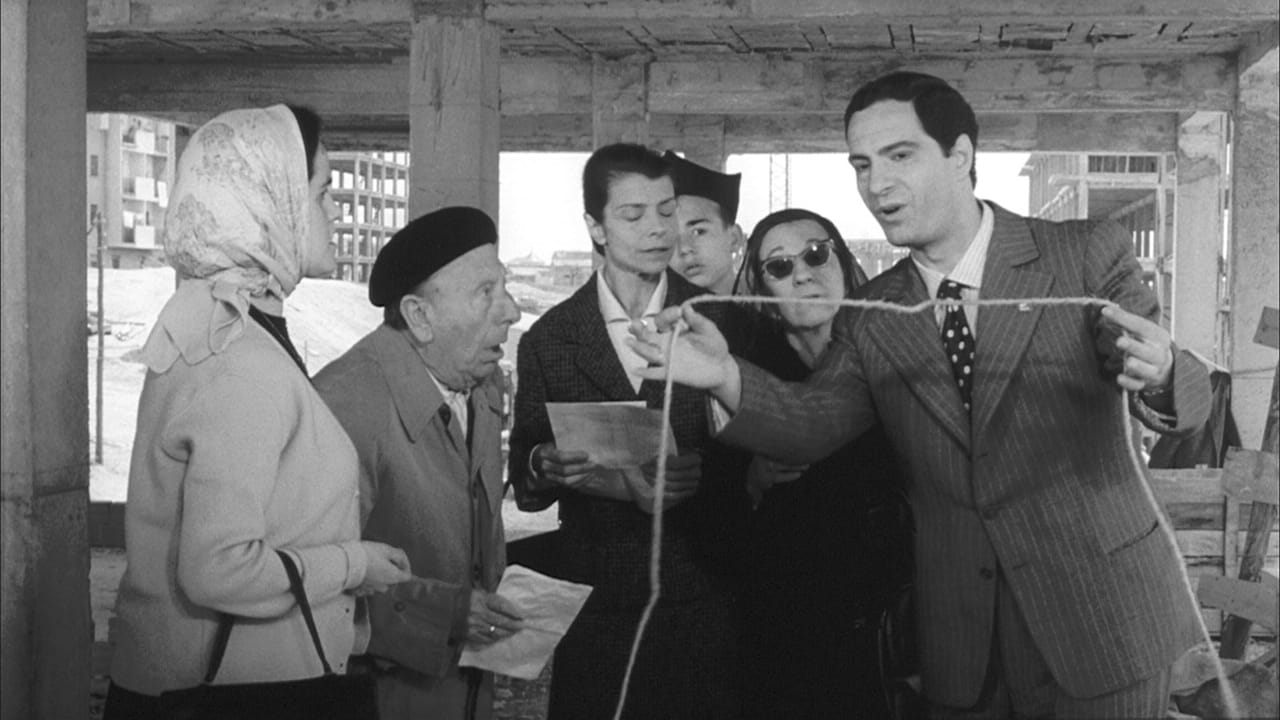Interesteg
What makes it different from others?
BootDigest
Such a frustrating disappointment
ChicDragon
It's a mild crowd pleaser for people who are exhausted by blockbusters.
Freeman
This film is so real. It treats its characters with so much care and sensitivity.
lasttimeisaw
Spanish writer-director Luis García Berlanga's eighth feature film is a Spain-Italy co-production, stars Italian matinée idol Nino Manfredi as an unassuming undertaker, José Luis Rodríguez, whose marriage prospect is not so encouraging due to his profession. Through chance meeting with a senior prison executioner Amadeo (Isbert), he gets acquainted with his daughter Carmen (Penella), who is also pestered by the same pickle, no one is willing to marry her simply because of Amadeo's job, so the two chime in instantly and apparently it is a perfect match, but soon life put José through the wringer of a series of exigencies (Carmen's pregnancy, marriage and a thorny apartment issue), his ideal future where he can get rid of this disreputable trade becomes more and more unattainable, once he has been pushed to register as a successor of his father-in-law, aka. a new executioner is born.On the horns of a dilemma, José's predicament is wittily delineated through Berlanga's delightful verve, exerts a realistic spin on the irony of life, how one's ideal having been gradually crushed by the twist of fate. Manfredi's interpretation of José affects in earnest, he is spontaneously sympathetic to establish José as a nobody, stuck in the line of work which he doesn't like, exhibits his own foibles through his marriage, and lives by his blind faith that he could still opt out against the worst-case scenario, until his melt-down when the bubble is burst.Veteran Spanish actor José Isbert plays Amadeo enthusiastically, who is decidedly persevering in tricking José to take over his mantle, so as to secure the marriage and an apartment assigned from the government, he is manipulative on top of his goody-goody persona, but we cannot blame him for his simple-mined selfishness, plainly because that's the widespread mindset among most people in the world. As for Emma Fenella, her Carmen is an uncomplicated sort, maternal, down- to-earth and forges strong protection to the men in her life.The satirical connotation of morbidness seeps through the debate over the variations of death penalty (garrotte seems to be the most civilised choice), and a unanimous bias towards a now obsolete vocation. A vignette of José and Carmen's frugal wedding right after a fancier one, and the tour in Palma de Mallorca, where the lovey-dovey luxuriates in a string concert on the creek inside a large cave, exactly in that moment, José's duty call arrives, these are brilliant instances where realism meets cinematic creation, whether they are bittersweet, heartfelt or intriguing, together they bring about vigour and pleasure to the audience and it is a telling testimony of a director's faculty.
ma-cortes
Another masterpiece by the notorious filmmaker Luis Garcia Berlanga who shows the lively as well as sad existence of an executioner . Maestro Berlanga realizes another excellent film plenty of irony , habits , Spanish social life , good feeling and political critical . An undertaker (Nino Manfredi) gets married to an old executioner (Jose Isbert)'s daughter (Emma Penella) and, although he doesn't like it, must continue the profession of his father-in-law after his retirement . However , his profession is not exactly what you could call ¨popular¨ . As when the old man retires, his place is vacant , as his son-in-law doesn't like at all becoming an executioner, but that is the only way to keep the house where he is going to live after getting married. This is an enjoyable story that contains busy comedy , humor , frantic pace , blatant critical against death row , amusing gags , rowdy satire , noisy hustle and is pretty entertaining . It is considered to be one of the best films from Spanish cinema history and has been voted second best Spanish film by professionals and critics in 1996 cinema centenary .The main and support actors stand out under perfect direction of Berlanga , including sour criticism as well as carried out in previous and subsequent works such as ¨Placido or Escopeta Nacional¨ that include bitter , pessimistic descriptions of social classes . In ¨el Verdugo¨ we can find very fun characters, all of them caricatures of the "spanish way of life" and a mirror on the Spanish society by that time . ¨El Verdugo¨ (1963), one of the undisputed masterpieces and fundamental in filmography of Luis Garcia Berlanga where shows the miseries of an amoral society and shot at the height of his creativity, in a period cultural difficult, where the enormous censorship of the political regime, exacerbated the ingenuity and imagination of the scriptwriters . Awesome playing by Nino Manfredi as a naive , ingenuous ,gentle undertaker turned into executioner , an agreeable Emma Penella and of course , the great Jose Isbert , Berlanga's habitual , in the best interpretation of his long career . The movie displays a Spanish secondary star-studded such as : Maria Luisa Ponte , Jose Maria Prada , Angel Alvarez , Xan Das Bolas , Alfredo Landa , Agustin Gonzalez , Chus Lampreave , Jose Saza , Julia Caba Alba , Antonio Ferrandis , Jose Luis Coll , Felix Fernandez , Jose Orjas and the likable Jose Luis Lopez Vazquez who improvised the moment when measured the child's head , among others . Evocative cinematography in white and black by Tonino Delli Colli , Sergio Leone's usual cameraman ; being filmed on location in Island of Mallorca , Madrid exteriors and C.E.A. studios , Ciudad Lineal, Madrid. Atmospheric and adequate musical score by Miguel Asins Arbo .Direction by Luis Garcia Berlanga is very good , he shows his skill for edition , realizing long shots with crowd who moves easily Berlanga filmed several polemic movies during the 50s , all of them were beset by difficulties with the censors caused by real critical to social stratum such as ¨Bienvenido Mister Marshall¨ (1953) , a very good film which tended not to be very well received by the censor for its acidity and considered to be one of the best Spanish films of the history ; however, his strong portrait of Spanish society , plenty of sharpness , didn't please the pro-Franco authorities . His next joint venture was ¨Los Jueves, Milagro¨ (1957), it was modified by the censors and delayed for several years before its eventual release . Later on , Berlanga made one of his best films ¨Placido¨ (1961) masterfully played by Cassen , this is the film debut for the great producer Alfredo Matas and received an Oscar nomination in 1963 , being well-received at the International Festivals , reviewing the useless charity , it's a sublime film but with censorship realized by this great maestro Luis Garcia Berlanga . He continued filming other interesting pictures as in 1973 he went to Paris to begin filming ¨Grandeur nature¨ with Michael Piccoli , another problematic film , focusing this time on the fetishism of a man who falls in love with a doll . Several years later , after Franco's death, he filmed a trilogy comprising ¨La Escopeta Nacional¨ (1978), ¨Patrimonio Nacional¨ (1981) and ¨Nacional III¨ (1982), where he clarified the evident disorders in the Spanish upper , middle-class upon being confronted with a new political status quo , realizing a sour denounce of the Spanish society . Berlanga ulteriorly shot a peculiar film titled ¨La Vaquilla¨ (1985) plenty of Spanish-star-cast and set in the Spanish Civil War , resulting to be the first time dealing with this convulsive period in comedy style . Following the same themes, he went on filming coral films such as ¨Moros and Cristianos¨ and ¨Todos a Carcel¨ (1993) that won three Goya Awards for Best Film, Best Director and Best Sound ; being his final film : ¨Paris Tombuctu¨. Rating ¨El Verdugo¨ : 8'5 , pretty good . Essential and indispensable watching for Berlanga aficionados . Better than average and well worth seeing . Essential and indispensable seeing .
brownieboy
I suppose the fact that this movie was made during the dictatorship of General Franco, when Spain did not register on any international cultural radars, accounts for the fact that it remains relatively unknown. In my opinion, this is not only the best film ever made by a Spanish director, but one of the best European films ever, and a masterpiece of dark comedy. It is a powerful indictment of the death penalty anywhere, and the scene in which proud and retiring executioner Amadeo sticks prospective son-in-law José Luis' fingers in the lamp fixture, thereby giving him a mild electric shock, remains an all-time classic ("You think that's bad? That's only 125 volts! The Americans are worse, with their electric chairs...")This movie is stronger, deeper and funnier than any recent comedies by the likes of Pedro Almodóvar and other Berlanga-influenced Spanish directors, due to the bleaker political reality against which it was made. There is more directorial talent involved and the performances are stronger, with the glorious José Isbert stealing the show as always.Times have improved in Spain, and filmmakers may have more freedom, but nothing as corrosive as this has been made since.
Miguel Angel Diaz Gonzalez
Here we have a tragicomedy about executions released in 1963, when executions and censorship did still exist in Spain. How did they do it...? I only can say... using their imagination. It has a really brilliant story, and a screenplay that combines in a so wise way the comic and dramatic/tragic aspects of the story. Also, the actors know at every moment what to do. As a result we find a really funny film, a really sad film... and a perfect recreation of the reaction of common people to a hard and dangerous epoque. A masterpiece in my opinion.

